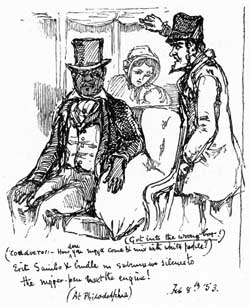The Lost Museum Archive
An Unpleasant Incident
In 1852-53, the popular British writer William Makepeace Thackeray toured the United States. While he lectured to enthralled American audiences, his secretary Eyre Crowe meticulously recorded the trip in words and pictures. Crowe, who studied painting in France, later published an illustrated memoir of the U.S. trip called With Thackeray in America. Crowe included in his account his observations during a train trip from Philadelphia to Baltimore, which included an incident involving the expulsion of a free African American from a whites-only passenger car. Crowe's simple story demonstrates the precariousness of free blacks' lives in antebellum American. Crowe would later turn sketches he made of a slave auction in Richmond, Virginia, into a series of paintings that starkly depicted the sale and subsequent forced separation of family members and friends.
More negro-limning engaged me as I left Philadelphia next day for Baltimore. It was not, as it turned out, a cheerful incident which I was to carry out, though begun without any idea further than that of an ordinary passenger's likeness. It happened thus. On seeing a good-humored negro attired in a chimney-pot hat, and leaning upon his modest linen bag (possibly his whole belongings), the sight was so novel I sketched him; but presently the car-man came up with anger in his countenance, and beckoned him away, saying "Get into the first car, sir--sitting here among white people, indeed!" He moved away as told; a mother clasping her infant, in an adjoining cushioned compartment, looked pitingly on the scene, as I did too. I now saw for the first time an ill-lighted compartment next the engine, in which were already ensconced a young negro and his wife, or female companion.
Whilst on this topic I may mention a pathetic story we were told at Baltimore of a lax white trader, who, besides his legitimate offspring, left a second family of dusky-coloured children. Not knowing, what was a fact, that he was insolvent, he left them free by his will. The creditors, not to be baulked, sold these little mulattoes as slaves, to be sent down South. Dire war has done this good--that such fell purposes can never more be carried out on a free soil.

Source: Eyre Crowe, With Thackeray in America (London: Cassell and Co., 1893), 104-05.